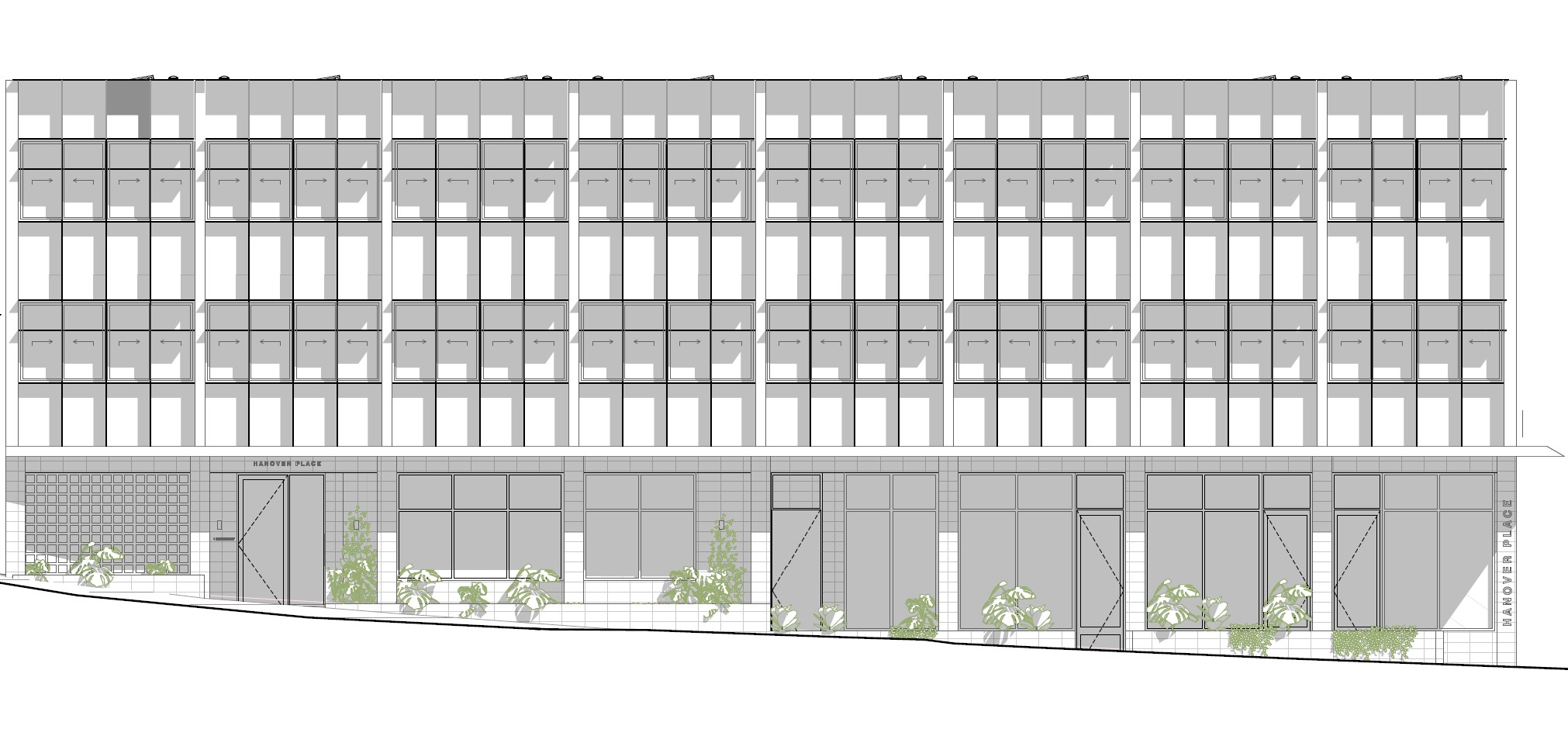HANOVER PLACE
VISION

At the heart of this project lies the innovative ‘share home’ concept—an architectural response to the growing need for sustainable, socially connected urban living. Designed by award winning Melbourne based Breathe Architects in collaboration with our local partner The Development Collective.
Located on a prominent corner site in central Dunedin, this three-storey mixed-use development integrates commercial activity with compact, community-focused residential living. Through thoughtful design, the project challenges conventional housing models by prioritising communal spaces over private excess, fostering connection, collaboration, and a shared sense of purpose.
The building comprises sixteen studio apartments supported by shared facilities on the ground floor, including a communal lounge, kitchen, and laundry. These amenities are positioned to encourage everyday interaction between residents, facing circulation areas that promote casual encounters while maintaining a balance of visibility and privacy. This spatial arrangement supports a socially resilient lifestyle—offering moments of solitude within a framework that encourages community.
Commercial tenancies address both Hanover and Filleul Streets, creating a fine-grain urban interface that activates the footpath and invites a dynamic relationship with the public realm. A covered arcade runs along the Filleul Street frontage, offering shelter and legibility to the commercial edge. The residential lobby is recessed to the north of this arcade, clearly defined and set back for privacy. This entry zone includes the letterbox bank and a discreet, screened access to the refuse room, ensuring services are well-integrated and visually separated from residential and public-facing spaces.
This development reflects a deliberate, values-led approach to urban housing—compact yet generous, efficient yet human, durable yet soft. It creates not just a building, but a small ecosystem of living and shared experience. Through its mix of residential and commercial uses, finely tuned material expression, and socially responsive planning, 4 Hanover Street offers a compelling model for contemporary, community-oriented city living in Ōtepoti Dunedin.
Located on a prominent corner site in central Dunedin, this three-storey mixed-use development integrates commercial activity with compact, community-focused residential living. Through thoughtful design, the project challenges conventional housing models by prioritising communal spaces over private excess, fostering connection, collaboration, and a shared sense of purpose.
The building comprises sixteen studio apartments supported by shared facilities on the ground floor, including a communal lounge, kitchen, and laundry. These amenities are positioned to encourage everyday interaction between residents, facing circulation areas that promote casual encounters while maintaining a balance of visibility and privacy. This spatial arrangement supports a socially resilient lifestyle—offering moments of solitude within a framework that encourages community.
Commercial tenancies address both Hanover and Filleul Streets, creating a fine-grain urban interface that activates the footpath and invites a dynamic relationship with the public realm. A covered arcade runs along the Filleul Street frontage, offering shelter and legibility to the commercial edge. The residential lobby is recessed to the north of this arcade, clearly defined and set back for privacy. This entry zone includes the letterbox bank and a discreet, screened access to the refuse room, ensuring services are well-integrated and visually separated from residential and public-facing spaces.
This development reflects a deliberate, values-led approach to urban housing—compact yet generous, efficient yet human, durable yet soft. It creates not just a building, but a small ecosystem of living and shared experience. Through its mix of residential and commercial uses, finely tuned material expression, and socially responsive planning, 4 Hanover Street offers a compelling model for contemporary, community-oriented city living in Ōtepoti Dunedin.
ARCHITECTURE
Architecturally, the building embraces a language of compactness and clarity. Its form is rectilinear and modest in height, comfortably integrated with its surrounding context. The ground floor is grounded in stack-bonded exposed concrete blockwork—robust, textural, and civic in its character. The upper levels contrast with profiled metal cladding in a soft grey tone, providing a lightweight counterpoint to the base while reinforcing a cohesive, material-driven expression. Anodised aluminium windows are deeply recessed and paired with vertical sun-shading fins, offering rhythm and articulation to the façade while improving thermal performance.
Material reductionism underpins the detailing strategy—“doing less with more.” Durable, low-maintenance finishes support both economic and environmental responsibility. Each material is chosen for its longevity, tactile quality, and contribution to a warm, resilient domestic environment. The design prioritises natural daylight and passive ventilation, with carefully placed glazing and the potential for rooftop solar panels contributing to the building’s sustainable performance.
Material reductionism underpins the detailing strategy—“doing less with more.” Durable, low-maintenance finishes support both economic and environmental responsibility. Each material is chosen for its longevity, tactile quality, and contribution to a warm, resilient domestic environment. The design prioritises natural daylight and passive ventilation, with carefully placed glazing and the potential for rooftop solar panels contributing to the building’s sustainable performance.



LOCATION
The building’s urban setting supports an active, car-light lifestyle. With George Street shopping, public transport, and other amenities within walking distance, the development encourages active modes of transport while reducing dependence on private vehicles. This alignment with broader sustainability goals reinforces the project’s commitment to low-impact living.





